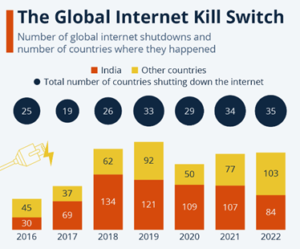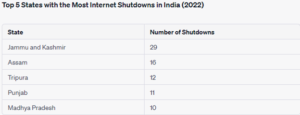Our digital double standards.
Relevance
- GS 2: Government Policies and Interventions for Development in various sectors.
- Tags: #DigitalIndia #InternetShutdowns #G20Summit #DigitalInclusion #G20DEWG #IndianExpressEditorialAnalysis.
Why in the News?
India’s digital landscape is a contradiction of progress and setbacks, with a growing tech-savvy population coexisting with frequent internet shutdowns. This duality raises crucial questions about the nation’s digital future.
India’s Digital Duality
- India ranks second globally in active internet users and social media users, showcasing its digital reach and potential.
- However, it has consistently imposed the highest number of internet shutdowns for five consecutive years, depriving millions of connectivity, raising concerns about digital access and freedom.
Technological Advancements vs. Digital Divide
- India is actively involved in the development and deployment of advanced technologies like 5G infrastructure and even 6G system prototypes.
- Simultaneously, a significant portion of the population remains stuck in the 2G era, highlighting the stark digital divide within the country.
Aadhaar’s Benefits vs. Privacy Concerns
- India has made significant progress in building Aadhaar, a unique digital ID that provides benefits such as simplified government services and identity verification.
- However, Aadhaar has faced criticism for its disproportionate harms, including privacy concerns and infrastructural gaps.
- Internet shutdowns can hinder the authentication of Aadhaar, affecting access to essential services like ration distribution.
- Aadhaar is also fundamental for UPI payments, but connectivity is required for this system to function effectively.
Digital India’s Image
The G20 Summit happening in New Delhi could make people think that Digital India has a lot of confusing and uncertain things going on in its digital plans.
- Call for Commitment – To counter this image, there is a need for a commitment to refrain from intentionally disrupting access to the internet and communication services during the summit.
- G20 Digital Economy Working Group (DEWG) Discussions – The G20 Digital Economy Working Group (G20 DEWG) discussions in the current year provide a foundation for this commitment.
- Consistency with India’s Position – India’s attitude in other major intergovernmental conferences, such as the G7, is consistent with the need to provide continuous access to digital services.
Alarming Internet Shutdown Frequency
- According to a Keep It On alliance and Access Now research, India is the only G20 country that will have shut down the internet more than twice (84 times) in 2022.
- India’s chairmanship of the G20 summit in 2023, with its emphasis on all things digital, telecom, and internet, provides an opportunity to commit to change and demonstrate leadership, both for its own people and other governments.
G20 DEWG Meetings
- The G20 DEWG led talks on numerous key issues, including Digital Public Infrastructure, with inclusion as a dominating theme, and subjects such as “Digital Inclusion Connecting the Unconnected,” during four sessions.
- There has been no definitive mention to the regular suspension of internet access in India, which is completely at odds with the tone of these conversations. The agreed-upon principles and proposals would very probably be undermined if there was no commitment to unrestricted internet access.
Outcome document of G20 DEWG
- Principle of Inclusivity –The G20 DEWG outcome document emphasizes inclusivity, aiming to remove barriers and enable empowerment and last-mile access for all users.
- Human Rights Focus – It stresses the importance of respecting human rights in all phases of digital planning, design, building, and operation, underscoring the significance of preserving individual rights.
- High-Quality Digital Connectivity – Recognizes the critical nature of having high-quality digital connectivity that is accessible to all.
- India’s Collaboration – India has signed Memorandums of Understanding (MoUs) with four countries to share India Stack, a comprehensive digital solution implemented at a large scale. This includes digital ID, digital payments, and data management systems.
Human Rights-Driven Digital Vision India
- Human Rights Violations – Internet shutdowns are considered as disproportionate measures by civil society and UN Special Rapporteurs, as they violate human rights, notably the right to free expression.
- Economic Impact – Shutdowns lead to unemployment and significant economic losses running into thousands of crores of rupees, undermining India’s economic growth potential.
- Ineffectiveness in Curbing Violence – Internet shutdowns have not proven demonstrably effective in achieving their stated objectives of curbing violence or unrest.
- G20 DEWG Goals – To fulfill the goals outlined in the G20 DEWG outcome document, which emphasize inclusion, empowerment, and last-mile access, India must commit to not using internet shutdowns.
- International Leadership and Double Standards – Without such a commitment, India risks being an outlier among major democracies and cannot credibly lead in digital infrastructure or promise to enhance access to cutting-edge technologies globally, while its citizens frequently face inexplicable digital deprivation.
G7 “Open Societies” Joint Statement (2021)
In 2021, India signed a joint statement with the G7 nations that were focused on “Open societies.”
- Condemnation of Politically Motivated Shutdowns – This joint statement specifically condemned “politically motivated shutdowns,” highlighting concerns about internet shutdowns that were seen as being driven by political motives.
- Evolution of the Statement – It’s noteworthy that an earlier version of this statement, signed only by the G7 countries, did not include the qualifier “politically motivated” when condemning shutdowns.
- International Contention – India’s frequent use of internet shutdowns has been a contentious issue for various international organizations, including those that participated in the G20 meetings.
- Concerns from Democratic Regions – Democratic regions like the United States (US) and the European Union (EU) have expressed concerns about India’s internet shutdown practices, reflecting the global attention and debate on this issue.
As India’s presidency of the G20 summit concludes after two years, it’s essential to reflect on the progress made and the steps needed to fulfill its ambitions in the digital realm. While a small step was taken in 2021, there has been limited follow-through.
To realize its aspirations of digital growth and global leadership, India must take a significant leap forward by committing to end internet shutdowns. This move would align with the characteristics the government has emphasized – inclusivity, decisiveness, ambition, and action-oriented approach, turning them from words into the foundational pillars of India’s digital journey.
Source: Indian Express
Mains Question
Examine the impact of frequent internet shutdowns in India on human rights, the economy, and social inclusion. What measures can be taken to address these issues while maintaining security concerns?





